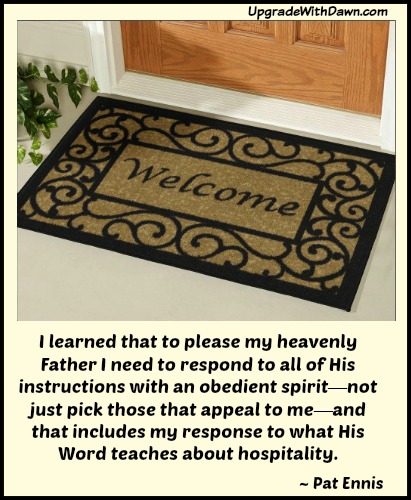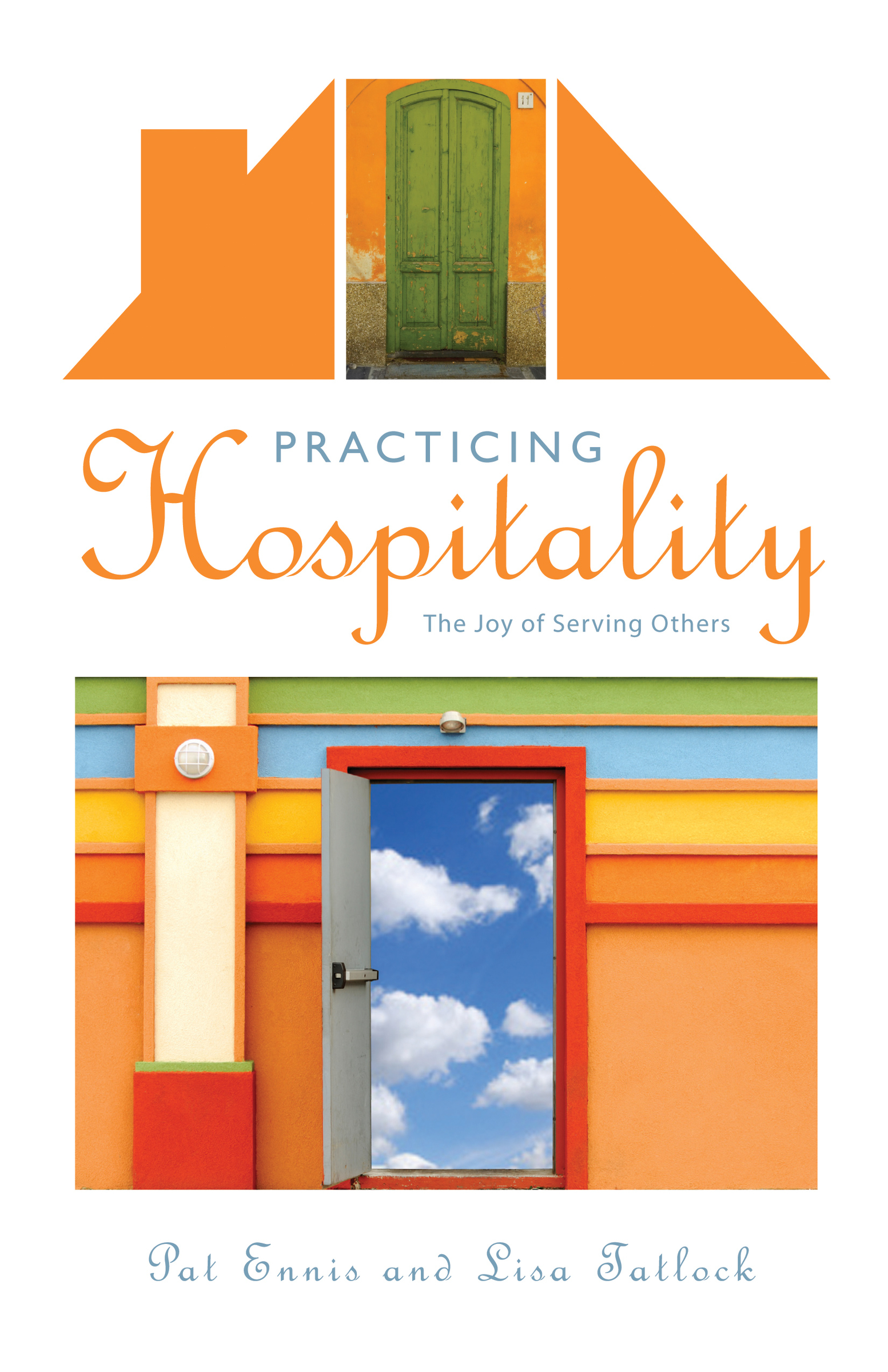Do You Entertain, or Practice Biblical Hospitality?
Pat Ennis—with her strong background in home economics— is an excellent person to write about hospitality. An educator and author, she desires for women to practice the Titus 2 mandate, and in this  Hospitality UPGRADE, she hones in on the difference between entertaining and true hospitality.
Hospitality UPGRADE, she hones in on the difference between entertaining and true hospitality.
"Whether enjoying personal devotions, a Bible Study, or a worship service, a variety of mental images may emerge when you are presented with the passages that encourage the practicing of biblical hospitality," Pat says.
"For many the images are based on the glossy photos in women’s magazines—an immaculate home, a gourmet menu, and an exquisite table setting."
I (Dawn) understand what Pat's saying. For years, I thought my house had to be "picture perfect" before I could be hospitable. I'm glad Pat is making a clear distinction here.
Pat continues . . .
While some of these images could be applied to Biblical hospitality, what they actually portray is entertaining.
When hospitality is described in the scriptures, there is an absence of instructions relating to the home décor, menu or table setting.
Let’s take a journey through scripture as we paint a word portrait of biblical hospitality.
John 14:15 and 21-24 clearly states that the primary evidence that individuals are Christians and that they love their heavenly Father is their choice to obey His commands.
Though we live in a world that promotes “have things your own way,” I learned that to please my heavenly Father I need to respond to all of His instructions with an obedient spirit—not just pick those that appeal to me—and that includes my response to what His Word teaches about hospitality.
- Romans 12:13b says I am to practice hospitality—literally I am to “pursue the love of strangers” (Hebrews 13:2)—not simply offer hospitality to my friends. If I want to demonstrate obedience to my heavenly Father, I will choose to practice hospitality.
- 1 Peter 4:9 builds on the instruction to practice hospitality and reminds me that my attitude is of utmost importance—I am to practice hospitality without complaining! This verse challenges me to conduct a heart search to discern what my attitude is and whether I am approaching this opportunity to minister with a “hearty attitude” (Colossians 3:23).
- I am reminded in Hebrews 13:2 that my willingness to extend hospitality may have far-reaching implications. As we study the lives of Abraham and Sarah (Genesis 18:1-3), Lot (Genesis 19:1-2), Gideon (Judges 6:11-24), and Manoah (Judges 13:6-20), we learn that all entertained strangers who were actually special messengers from God. While my motive should never be to give so that I will receive, Luke 6:38 clearly states that the measuring cup that I use to dispense my gifts and talents will be the same one used to provide my needs. What is the size of your hospitality measuring cup?
- One of the requirements for church leadership, according to 1 Timothy 3:1-2 and Titus 1:7-8, is a willingness to allow others to observe them in their homes—the arena where their character is most graphically revealed. Are you privileged to be in a leadership position in your church? If so, remember that these verses are requirements, not suggestions!
The attitude of the apostle Paul is one that all women who desire to cultivate a heart of biblical hospitality will want to copy.
As we study the scriptural passages that challenge us to practice hospitality most of us can reflect on a time when we tried to extended friendship to others and were met with rejection. If you are like me, Satan can use that rejection as a roadblock to prevent me from obeying my heavenly Father on future occasions.
Paul teaches us that he moved toward his heavenly Father’s will for his life—that of Christlikeness. He refused to dwell on the past or to drink of the cup of self-pity but, rather, kept climbing higher toward his goal of Christlikeness all the days of his life (Philippians 3:13-14).
If we are to cultivate a heart of biblical hospitality we must refuse to rely on past virtuous deeds and achievements or to dwell on sins and failures. As well, we must lay aside past grudges and rejection experiences.
Instead we will follow Paul’s example and continue the ascent to the top of the “hospitality mountain.” That ascent begins with developing proper climbing strategies—here are some to get you started:
- Collect and file simple, inexpensive recipes for desserts and meals.
- Make a list of people who would be encouraged by your offer of hospitality—purpose to invite your first guests soon!
- Start simple—spontaneously inviting someone home after Sunday evening church is a great beginning.
- Pray that our loving heavenly Father will give you joy in demonstrating hospitality to others.
- Remember that memories require time and energy to create.
- Purpose to nurture a ♥ for Biblical hospitality that sincerely communicates “come back soon."
Are you willing to take a step of faith and begin your ascent up the “biblical hospitality mountain?”
 Pat Ennis is a Certified Family and Consumer Science (Home Economics) Educator. She is the author of multiple books including Practicing Hospitality, the Joy of Serving
Pat Ennis is a Certified Family and Consumer Science (Home Economics) Educator. She is the author of multiple books including Practicing Hospitality, the Joy of Serving  Other with Lisa Tatlock (Crossway). Her most recent book is God Is My Strength, 50 Biblical Responses to Issues Facing Women Today (Christian Focus). Visit Pat’s Blog. Pat's life mission is to (1) Love her Lord with ALL of her heart (Matthew 22:37); (2) Walk worthy of her calling (Ephesians 4:1-3); and (3) Train the younger women to fulfill the Titus 2 mandate so that God's Word will not be discredited (Titus 2:3-5).
Other with Lisa Tatlock (Crossway). Her most recent book is God Is My Strength, 50 Biblical Responses to Issues Facing Women Today (Christian Focus). Visit Pat’s Blog. Pat's life mission is to (1) Love her Lord with ALL of her heart (Matthew 22:37); (2) Walk worthy of her calling (Ephesians 4:1-3); and (3) Train the younger women to fulfill the Titus 2 mandate so that God's Word will not be discredited (Titus 2:3-5).
Image of Welcome mat, Ottomanson Welcome Mat from Home Depot.
 Post a Comment → Posted on
Post a Comment → Posted on  Thursday, June 20, 2019 at 10:00AM
Thursday, June 20, 2019 at 10:00AM  Hospitality,
Hospitality,  Hospitality vs. Entertaining,
Hospitality vs. Entertaining,  Pat Ennis,
Pat Ennis,  Upgrade with Dawn Upgrade Your Life
Upgrade with Dawn Upgrade Your Life  Biblical Thinking,
Biblical Thinking,  Hospitality
Hospitality 









